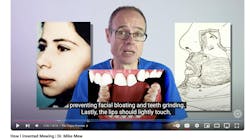Guide dental patients to accept treatment with motivational interviewing (MI)
Dentists should try to learn the art of motivational interviewing (MI). This method of communication guides dental patients toward case acceptance because they learn what they value about their dental treatment.
How do we talk to patients so they will listen? How do we listen so patients will talk?
These simple questions capture the spirit of motivational interviewing (MI). MI is a counseling style that helps health-care professionals guide patients to recognize their own reasons for change, which can motivate them to commit to change.
It can be hard for patients to accept our advice when it comes to behavior change. Most dentists give advice easily. But many patients don't need information, they need motivation. Giving unsolicited information without establishing a trusting relationship can have the opposite effect of what we’re looking for. Telling patients what to do presses the “pause button” on behavior change and can actually slow the process of resolving ambivalence.
Blaise Pascal said, “People are generally better persuaded by the reasons which they have themselves discovered than by those which have come into the mind of others.” When people tell us what to do, a part of our brain actually argues against that information and we become more resistant. When we hear ourselves thinking against change, our brain lays down neural pathways that validate our current position. As dentists, we educate patients and assume we can persuade them with logic. Instead, we must be mindful of how they volley the pros and cons of behavior change in their minds, trying to convince themselves that change is not necessary. Motivational interviewing can help resolve ambivalence and elicit a person’s own motivation for change.
American Dental Association research shows the top two reasons people do not get dental treatment is cost and perceived need. Finances will always be an obstacle. However, perceived need is subjective. The very word many dentists use to discuss treatment plans is “need.” For example, “Mrs. Jones, you have an infection in your gums. You need scaling and root planing.” People will pay for what they value before they pay for what they need.
Our primary task as dentists is finding out what patients value. Telling them what they need is not very motivating or persuasive. Needs sustain ambivalence, and values trump ambivalence. An example is informing patients they need SRP to treat gum disease as opposed to taking the time to find out about their health goals. If a patient says he or she is on a diet and exercising regularly, we can conclude the person values a healthy lifestyle. Consequently, recommending SRP aligns with his or her values of improved health. Before we tell patients what they need, we should find out what they value.
The basic skills of motivational interviewing can be developed by using the acronym OARS—open-ended questions, affirmations, reflecting listening, and summaries.
Open-ended questions
Open-ended questions are ones that cannot be answered with a yes or no, but rather invite someone to elaborate and reflect. “What worries you about your current dental situation?” or, “What do you know about oral health and its connection to overall health?”Affirmations
Affirmations are statements that recognize patients’ behaviors, good intentions, and efforts that are moving them forward. Affirmations are not praise. “Thank you coming on time today,” or, “I can tell you’ve been flossing.”Reflections
A reflection is the dentist’s attempt to give meaning to what a patient says. An effective reflection is brief and concise and causes the patient to talk more. Reflections are invaluable in MI. They can be simple, where the dentist repeats what the patient said, or complex, where the dentist gives meaning to the statement or information the patient shared. For example, after a patient says, “I just want what my insurance covers,” a complex reflection could be, “We need to keep your dental care within your budget.”Summaries
Summaries are reflections that recap what a person has been saying. Effective summaries confirm to a patient that the dentist has been listening and has a grasp of the patient’s information.By incorporating the OARS concept as part of our communication with patients, we can become skilled in MI and help our patients find value in the treatment they need. In health care, dentistry is unique with respect to behavior change. Money plays a big role in the decisions patients make. Dentists are realizing that different approaches to presenting treatment are needed, and MI is gaining traction. In fact, there is a new CDT code in 2017 for Motivational Interviewing, D9993 (dental case management—motivational interviewing).
Becoming skilled in MI can have a profound effect on your practice. Patients feel empowered to become actively involved in their health care. In turn, you will not only experience less stress, but you can also help your patients achieve more favorable clinical outcomes.
Sonny Chokka, DDS, is a graduate of Loma Linda University School of Dentistry. He is an owner dentist supported by Pacific Dental Services, and a faculty member of the PDS Institute.





